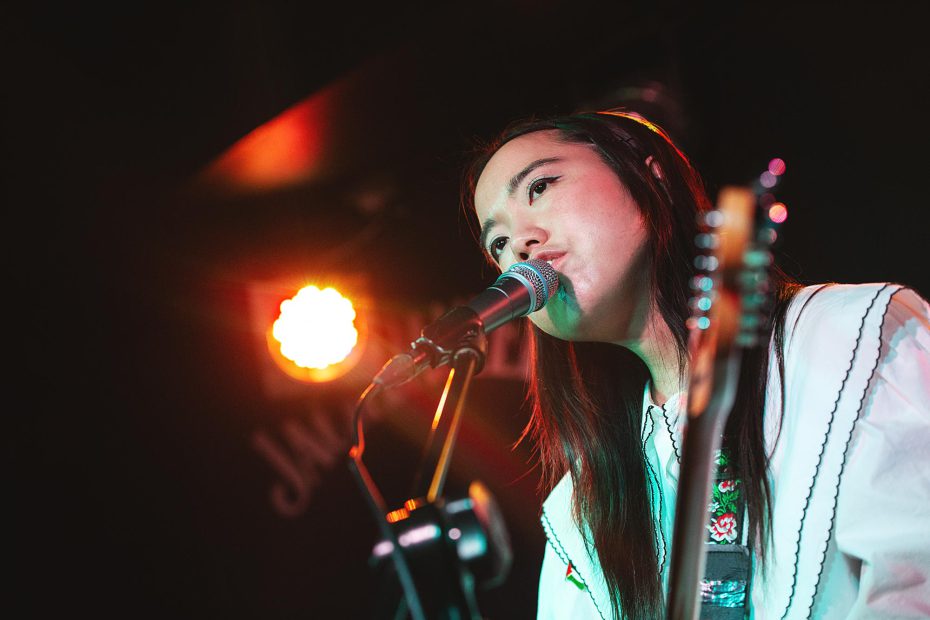mui zyu makes dreamy pop music with noise rock interludes. More specifically, she describes music as falling through a portal. I can’t find a better explanation for the wonderland that ensues in the Sunflower Lounge that night; there must be magic at work, with every soaring note and thoughtful melody pushing us beyond, into her world. Developing ethereal harmonies and experimental electronics, the genius of her studio recordings is elevated by the warmth of her live performance. “Hello, friends”, are the first words she speaks, and she proceeds as an inviting, vulnerable, fascinating host. When not playing guitar, she holds her hands behind her back, attentive; she’s a light touch. There’s an effortlessness to her vocals, that confidence growing from small smiles to a focused gaze.
Even in the most literal senses, mui zyu’s work goes far beyond music. Her storytelling draws from real life, seeking the musicality of all things. Sampling throughout gives her music a tender, personal feel. Mother’s Tongue is a beautiful dedication to heritage, care, and the negotiations of a mother/daughter relationship. It tracks the struggle for expression, of “words…hidden in your lungs”, of faked smiles. Here, music becomes an alternate form of articulation, her dreamy, enchanting chords like a different language we are invited to understand. Her vulnerable performance makes me lean closer, ruminating further the lyrics, “don’t need to forgive you / for something you didn’t mean to do”. The song ends with a snippet of her mother’s voice, telling her she’s proud. I can’t recommend this track enough. It’s achingly beautiful, and I’ve had it on repeat ever since.
mui zyu seems fascinated by the musicality of language. She speaks of her Hong Kong heritage, and tells us she’s been learning Cantonese, reciting phrases for us with a beaming pride. She launches into donna likes parasites, an uptempo, jangly pop tune. It’s performed, again beaming, in Cantonese. Her most recent release is titled a ‘cantonese tasting menu’, an EP of cantonese versions from her album ‘nothing or something to die for’. This is a fascinating prospect for her music, and for the bilingual potential of music in general, as sound transcends into universal comprehension. The re-release explores this tension between languages, and suggests the alternate sonic possibilities of language, as her familiar work is given new life through alternate vocals.
Her performance develops in Ghost With A Peach Skin, which she accompanies with a dance. It’s a series of simple, repeating motions, a dance she takes her time with, bringing her measured attitude to the body. There are moments where her palms are raised to the ceiling, and her eyes follow them; it’s contemplative, and gentle, and measured, seeming an abstracted parody of the era of TikTok dance. mui zyu runs with the simplicity of contemporary dance, reinterpreting it to mean some instinctive response to dance. The audience responds alongside her, nodding and swaying to her dreamy compositions.
In a powerful conclusion, mui zyu speaks of Palestine. Her music is strongly and unshakingly dedicated to “a more peaceful future”. Emerging from the portal, and faced with the prospect of the cold night and the same old everyday, it’s clear I’m not the only one who feels transformed. The audience all seem a little stupefied, and my friend Seth (now co-reviewer) summarises the night as “an out of body experience”. We linger, trying to stretch that moment out. It’s an honour to share her irresistible world, if just for an evening.
